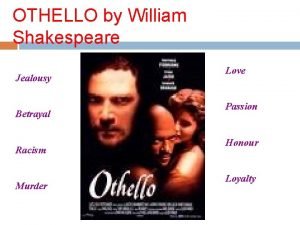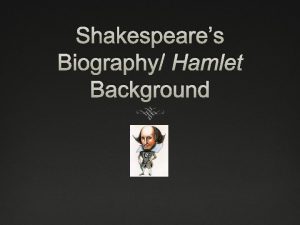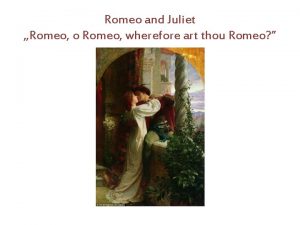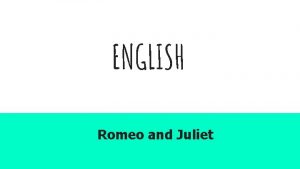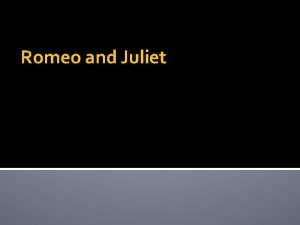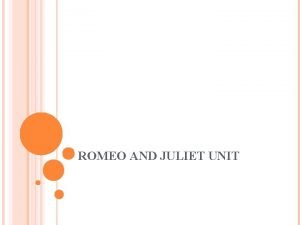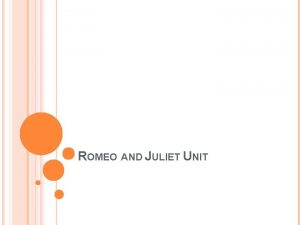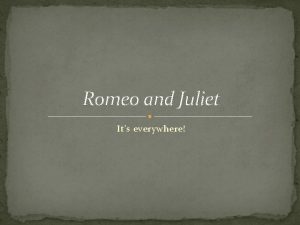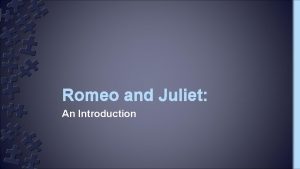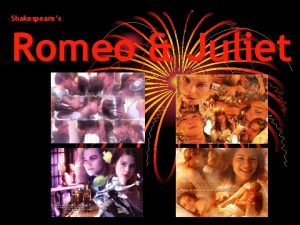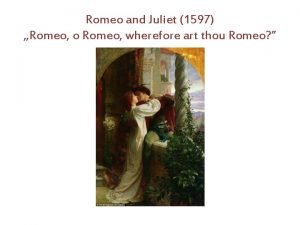TeacherofEnglish com Romeo and Juliet 1 Shakespeares Life












- Slides: 12

Teacher-of-English. com Romeo and Juliet 1 Shakespeare’s Life and Times

William Shakespeare was born in Stratford on about April 23 rd 1564. His father William was a successful local businessman and his mother Mary was the daughter of a landowner. Relatively prosperous it is likely the family paid for William’s education, although there is no evidence he attended university. In 1582 William, aged only 18, married an older woman (26) named Anne Hathaway. Soon after they had there first daughter, Susanna. They had another 2 children but William’s only son Hamnet died aged only 11. After his marriage information about the life of Shakespeare is sketchy but it seems he spent most of his time in London writing and performing in his plays, only returning home during Lent when all theatres were closed. It is generally thought that during the 1590 s he wrote the majority of his sonnets. This was a time of prolific writing and his plays developed a good deal of interest and controversy. A Midsummer Night’s Dream, Romeo and Juliet and Two Gentlemen of Verona were written between 1589 and 1595.

Plenary Feedback to a partner or the rest of the group. Discuss what you have highlighted and how you decided whether the information was about his personal or professional life.

Prepare Your Notes Decide which style of notes you are going to use and quickly sketch out a spider diagram or headings for bullet points. Personal life Professional Life • Born 1564 • Birthplace: Stratford, England • Family: Son of John and Mary Shakespeare

Shakespeare Video Click on the appropriate link to watch a brief biography of William Shakespeare: http: //www. youtube. com/watch? v=v. QG ATTeg 1 Os http: //www. youtube. com/watch? v=ORp URQls. Dz. Y&NR=1 http: //www. youtube. com/watch? v=L 9 t 1 1 Bs. E 0 yk&feature=related

Context At GCSE level you will need to write about the social, historical and literary context of Shakespeare’s plays. Use the research and notemaking skills you have developed to find out more about: • Elizabethan England • The Elizabethan Theatre • The role of women in Shakespeare’s time.

Romeo and Juliet Mind Map Elizabethan England The play Romeo & Juliet William Shakespeare Elizabethan Theatre Create a mind map using what you know about Romeo and Juliet and what you have learned about Shakespeare, Elizabethan England the Elizabethan Theatre.

Prologue Two households, both alike in dignity, In fair Verona, where we lay our scene, From ancient grudge break to new mutiny, Where civil blood makes civil hands unclean. From forth the fatal loins of these two foes A pair of star-cross'd lovers take their life; Whose misadventured piteous overthrows Do with their death bury their parents' strife. The fearful passage of their death-mark'd love, And the continuance of their parents' rage, Which, but their children's end, nought could remove, Is now the two hours' traffic of our stage; The which if you with patient ears attend, What here shall miss, our toil shall strive to mend.

A Closer Look Two households, both alike in dignity, In fair Verona, where we lay our scene, From ancient grudge break to new mutiny, Where civil blood makes civil hands unclean. From forth the fatal loins of these two foes A pair of star-cross'd lovers take their life; Whose misadventured piteous overthrows Do with their death bury their parents' strife. The fearful passage of their death-mark'd love, And the continuance of their parents' rage, Which, but their children's end, nought could remove, Is now the two hours' traffic of our stage; The which if you with patient ears attend, What here shall miss, our toil shall strive to mend. The prologue introduces themes of the play. It contains both positive and negative words and contains a number of contrasting images. There also repeated references to pairs or things in twos. With a partner highlight positive words in green, negative words in red and references to pairs or twos in blue.

Positive, Negative and Pairs Two households, both alike in dignity, In fair Verona, where we lay our scene, From ancient grudge break to new mutiny, Where civil blood makes civil hands unclean. From forth the fatal loins of these two foes A pair of star-cross'd lovers take their life; Whose misadventured piteous overthrows Do with their death bury their parents' strife. The fearful passage of their death-mark'd love, And the continuance of their parents' rage, Which, but their children's end, nought could remove, Is now the two hours' traffic of our stage; The which if you with patient ears attend, What here shall miss, our toil shall strive to mend.

Positive, Negative and Pairs Two households, both alike in dignity, In fair Verona, where we lay our scene, From ancient grudge break to new mutiny, Where civil blood makes civil hands unclean. From forth the fatal loins of these two foes A pair of star-cross'd lovers take their life; Whose misadventured piteous overthrows Do with their death bury their parents' strife. The fearful passage of their death-mark'd love, And the continuance of their parents' rage, Which, but their children's end, nought could remove, Is now the two hours' traffic of our stage; The which if you with patient ears attend, What here shall miss, our toil shall strive to mend.

Tasks Complete the tasks below to convey your understanding of The Prologue 1. What do we learn about the two families in the play? 2. What happens to the two lovers? 3. What do we learn about the two families at the end of the play? 4. Can you identify specific contrasts or opposites used in the prologue? 5. In the prologue why do you think Shakespeare uses so many contrasts and opposites? What does this suggest about the play we are about to watch? 6. Can you identify the rhyming scheme used in the prologue? What kind of poem is it? Why is this style of poem appropriate? 7. What language techniques are used in the lines? From forth the fatal loins of these two foes A pair of star-cross'd lovers take their life 8. Using the prologue write a blurb for a new edition of the play aimed at teenagers.
 Minor characters in romeo and juliet
Minor characters in romeo and juliet Romeo and juliet script romeo romeo where
Romeo and juliet script romeo romeo where Bài thơ mẹ đi làm từ sáng sớm
Bài thơ mẹ đi làm từ sáng sớm Cơm
Cơm Themes of jealousy
Themes of jealousy Shakespeare tragedy about racism and jealousy
Shakespeare tragedy about racism and jealousy Shakespeare 1587
Shakespeare 1587 What are the themes of hamlet
What are the themes of hamlet William shakespeare idioms
William shakespeare idioms Romeo's character traits
Romeo's character traits Who said o romeo romeo where for arthous romeo
Who said o romeo romeo where for arthous romeo Romeo romeo quote
Romeo romeo quote Out your
Out your





